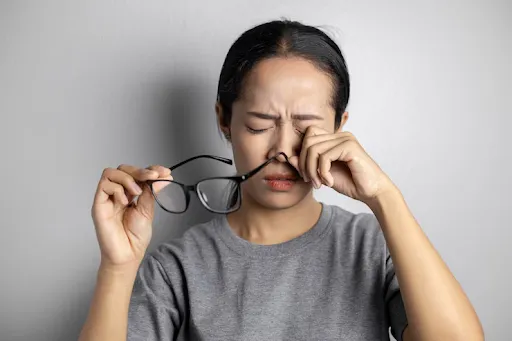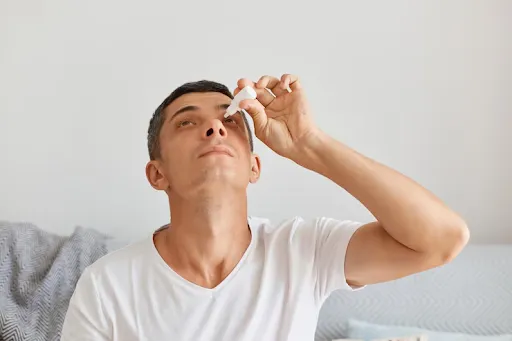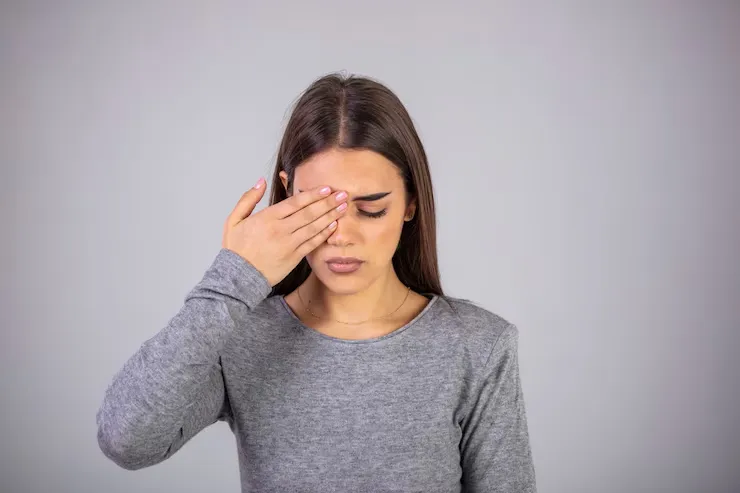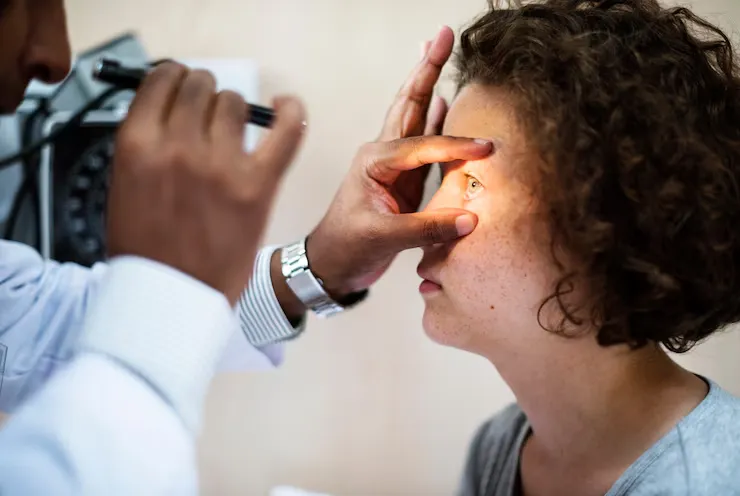Eye Health
Managing Eye Health During Allergy Season
FSDAVCFEBFEVSDDVFSD
FSDAVCFEBFEVSDDVFSD
FSDAVCFEBFEVSDDVFSD
Understanding Eye Allergies
Eye allergies, or allergic conjunctivitis, occur when allergens like pollen, dust mites, mold spores, or pet dander trigger the immune system to release histamines. This reaction leads to inflammation, causing symptoms such as itchy, red, watery eyes, swelling, and a burning sensation. These discomforts are especially common during spring and fall when pollen counts peak.
Recognizing the causes and symptoms of eye allergies is essential for effective management. Identifying allergens and minimizing exposure can reduce flare-ups. Simple steps, such as keeping windows closed during high pollen days and using air purifiers, can help. Consulting an eye care professional can also provide tailored treatment for relief and prevention.
Eye allergies, or allergic conjunctivitis, occur when allergens like pollen, dust mites, mold spores, or pet dander trigger the immune system to release histamines. This reaction leads to inflammation, causing symptoms such as itchy, red, watery eyes, swelling, and a burning sensation. These discomforts are especially common during spring and fall when pollen counts peak.

Recognizing the causes and symptoms of eye allergies is essential for effective management. Identifying allergens and minimizing exposure can reduce flare-ups. Simple steps, such as keeping windows closed during high pollen days and using air purifiers, can help. Consulting an eye care professional can also provide tailored treatment for relief and prevention.

Common Triggers and Symptoms
Eye allergies, also known as allergic conjunctivitis, can result from exposure to common environmental allergens. Pollen, released by trees, grasses, and weeds, is a primary trigger, particularly during spring and fall. Dust mites, microscopic organisms found in household dust, and mold spores, which thrive in damp environments, are also frequent culprits. Pet dander, consisting of tiny skin flakes shed by animals, can further exacerbate allergic reactions.
Symptoms of eye allergies typically include itchy, red, and watery eyes, along with swollen eyelids and a burning or stinging sensation. These symptoms can vary in intensity but often interfere with daily activities and overall comfort. Persistent discomfort, especially during allergy seasons or in allergen-prone environments, can significantly impact the quality of life if not managed appropriately.
Recognizing and avoiding specific triggers is vital for effective allergy management. Steps like keeping windows closed during high pollen seasons, using air purifiers, and maintaining cleanliness in living spaces can help reduce allergen exposure. Additionally, consulting an eye care professional for targeted treatment, such as antihistamine eye drops or prescription medications, can provide relief and prevent symptoms from worsening. Early intervention and proactive measures are key to maintaining comfort and eye health amidst allergen challenges.
Preventive Measures for Eye Allergies

Preventing exposure to allergens is essential for managing eye allergies effectively. Simple adjustments can help minimize triggers and reduce discomfort. During high pollen seasons, keep windows closed and rely on air conditioning to filter indoor air. Using air purifiers with HEPA filters can trap airborne allergens like pollen, pet dander, and dust mites, improving indoor air quality. Regular cleaning, including vacuuming carpets and upholstery, is crucial for reducing allergens in living spaces. Washing bedding in hot water weekly can further eliminate dust mites and pet dander, providing a cleaner sleep environment.

Limiting outdoor activities when pollen counts are high, especially in the early morning and evening, can also help reduce exposure. For those who must go outside, wearing wraparound sunglasses can shield the eyes from airborne allergens. By combining these strategies, individuals can create a more allergen-free environment and experience relief from eye allergy symptoms.
Managing eye allergies starts with minimizing exposure to allergens through practical adjustments at home and in daily routines. During high pollen seasons, keep windows closed and use air conditioning to maintain a filtered indoor environment. Air purifiers equipped with HEPA filters can effectively capture airborne allergens like pollen, pet dander, and dust mites. Regular cleaning is essential vacuum carpets, furniture, and curtains frequently, and wash bedding in hot water weekly to eliminate dust mites and dander. These steps can significantly reduce allergen presence in your living spaces.
When venturing outdoors, take precautions to shield your eyes from allergens. Wearing wraparound sunglasses can provide a protective barrier, preventing pollen and other irritants from reaching the eyes. Limit outdoor activities during peak pollen times, typically early morning and evening, to reduce exposure. Combining these preventive measures helps create a more allergen-free environment, alleviating symptoms like itching, redness, and watery eyes, and improving overall comfort.
Treatment Options for Eye Allergies
Relieving eye allergy symptoms often involves a combination of treatments tailored to individual needs. Artificial tears are a simple yet effective way to flush out allergens and soothe irritation. Over-the-counter antihistamine eye drops help reduce itching and redness by blocking the release of histamines, while oral antihistamines can provide comprehensive allergy symptom relief, including eye discomfort. Applying a cold compress to the eyes can further alleviate swelling and itching, offering quick, temporary relief.
For more severe or persistent symptoms, consulting an eye care professional is essential. They may recommend prescription treatments, such as stronger antihistamines or corticosteroid eye drops, to address intense inflammation and discomfort. Each treatment plan should consider the individual's specific triggers and symptoms, ensuring a targeted approach for lasting relief. Professional guidance ensures safe and effective management, helping individuals maintain comfort and protect their eye health during allergy seasons.
Lifestyle Adjustments for Allergy Season
Managing eye allergies often starts with simple lifestyle adjustments to minimize exposure to allergens. For instance, showering after outdoor activities can effectively remove pollen from the skin and hair, preventing it from lingering and aggravating symptoms. This is especially important during high pollen seasons when exposure is more frequent.
Another helpful practice is changing clothes upon entering the home. This prevents outdoor allergens like pollen or pet dander from spreading indoors and contaminating furniture or bedding. Keeping allergens at bay reduces the chances of triggering eye allergy symptoms.
Managing eye allergies often starts with simple lifestyle adjustments to minimize exposure to allergens. For instance, showering after outdoor activities can effectively remove pollen from the skin and hair, preventing it from lingering and aggravating symptoms. This is especially important during high pollen seasons when exposure is more frequent.
Another helpful practice is changing clothes upon entering the home. This prevents outdoor allergens like pollen or pet dander from spreading indoors and contaminating furniture or bedding. Keeping allergens at bay reduces the chances of triggering eye allergy symptoms.


Lastly, avoiding rubbing your eyes is crucial. Rubbing can intensify irritation, spread allergens, and even lead to further inflammation. By adopting these habits, individuals can create a more allergy-friendly environment, helping to manage symptoms and improve overall eye comfort.
When to Seek Professional Help
If eye allergy symptoms persist despite preventive measures and over-the-counter treatments, seeking professional guidance from an eye care expert becomes crucial. Persistent or severe symptoms may point to conditions beyond allergies, such as dry eye syndrome or eye infections, which require specific treatments. A thorough evaluation by an eye care professional can help pinpoint the root cause and ensure an accurate diagnosis, leading to effective management.
For more stubborn symptoms, eye doctors may prescribe targeted treatments. These can include stronger antihistamine or corticosteroid eye drops, designed to reduce inflammation, relieve redness, and alleviate itching. In severe cases, immunotherapy or allergy shots may be recommended to desensitize the immune system to particular allergens over time, providing longer-lasting relief.
Allergy testing may be beneficial for patients whose symptoms are driven by environmental factors. Identifying specific triggers, such as mold, pet dander, or pollen, enables the development of a personalized treatment and lifestyle plan. This approach empowers patients to take proactive steps to minimize exposure and better manage their symptoms, enhancing their overall quality of life.
Ignoring or delaying treatment for persistent eye allergies can lead to complications, including damage to the eye’s surface or worsening of underlying conditions. Consulting an eye care professional not only addresses discomfort effectively but also ensures long-term eye health. With the right treatment and guidance, individuals can regain comfort and focus on their daily activities without the burden of ongoing symptoms. Seeking expert care is a proactive step toward better vision and improved quality of life, safeguarding eye health for the future.
Importance of Regular Eye Exams
Regular eye exams are vital for safeguarding eye health, particularly during allergy seasons when symptoms like redness, itching, and irritation are more likely to occur. These exams enable eye care professionals to identify early signs of allergies and differentiate them from other eye conditions, ensuring accurate diagnosis and timely treatment.

Regular eye exams are vital for safeguarding eye health, particularly during allergy seasons when symptoms like redness, itching, and irritation are more likely to occur. These exams enable eye care professionals to identify early signs of allergies and differentiate them from other eye conditions, ensuring accurate diagnosis and timely treatment.
Routine check-ups provide an opportunity for tailored guidance on managing eye allergies. Eye doctors can recommend appropriate preventive measures, over-the-counter solutions, or prescription treatments based on individual needs. This personalized approach helps minimize discomfort and prevent symptoms from interfering with daily activities.
Routine check-ups provide an opportunity for tailored guidance on managing eye allergies. Eye doctors can recommend appropriate preventive measures, over-the-counter solutions, or prescription treatments based on individual needs. This personalized approach helps minimize discomfort and prevent symptoms from interfering with daily activities.
Beyond managing allergies, regular eye exams play a crucial role in maintaining overall ocular health. Early detection of underlying conditions such as dry eye or infections allows for prompt intervention, reducing the risk of complications. By prioritizing routine eye care, individuals can enjoy clearer, more comfortable vision year-round while ensuring long-term eye health.
Conclusion
Maintaining eye health during allergy season requires a proactive approach that combines preventive measures, effective treatments, and lifestyle changes. Understanding common triggers like pollen, dust, or pet dander helps individuals take precautions, such as keeping windows closed, using air purifiers, and limiting outdoor exposure during high pollen times. Adopting practices like frequent cleaning and avoiding eye rubbing further reduces allergen contact and irritation.
When symptoms persist, seeking professional guidance ensures accurate diagnosis and effective treatment. Eye care professionals can recommend suitable solutions, from artificial tears to prescription medications, tailored to individual needs. Coupled with preventive steps and lifestyle adjustments, these treatments help alleviate discomfort, protect eye health, and support overall well-being. By staying informed and proactive, individuals can navigate allergy seasons with greater ease and maintain clear, comfortable vision year-round.

Contact Info
Hours of Operation
Mon - Fri | 9:00 AM - 5:00 PM
Sat - Sun | Closed
Holiday Hours: We are closed for the following holidays: New Years Day, Memorial Day, Independence Day, Labor Day, Thanksgiving Day, Christmas Day
© 2026 Kleinwood Vision. All rights Reserved.


